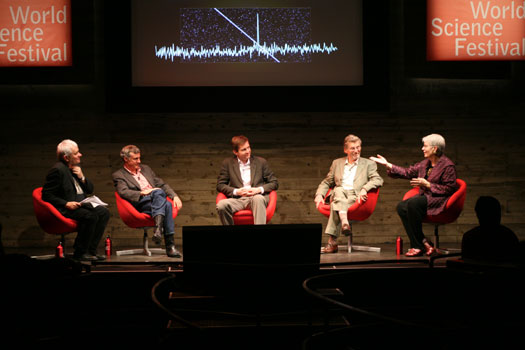
Photo by Robert Leslie
Last night at the Galapagos Art Space in Brooklyn, Nobel laureate Sir Paul Nurse moderated a discussion centered around the age-old question: Are we alone? Four scientists, including 2009 TED Prize winner Jill Tarter, shared their latest projects, which are better equipping Earthlings to answer this exciting question.
Steven Squyres, who works on NASA’s Spirit Mars Rover mission, announced that recent studies of Martian rock samples from 2005 show evidence of a wet, non-acidic environment that could have been favorable to life at one time. Lab tests confirmed the presence of high concentrations of carbonate, a precipitate of water. Carbonate dissolves in acid, so the remainder of carbonate in these rocks suggests neutral, life-friendly conditions. Squyers also mentioned the possibility for a life-friendly environment on Jupiter’s moon, Europa. Beneath Europa’s frozen outer layer may be an ocean supported by the moon’s internal heat, which could provide the metabolical energy necessary for life.
David Carbonneau explained how his hunt for exoplanets — planets orbiting nearby sun-like stars — could lead to the discovery of life elsewhere. Locating exoplanets involves monitoring certain constellations for eclipses caused by exoplanets passing by stars. As part of the NASA Kepler Team, Carbonneau searches for Earth-like planets that orbit their star’s habitable zone where there is potential for liquid water and life to exist.
Michael Russell proposed that our search for life shouldn’t be guided by the question, “What is life?” but rather “What does life do?” By studying the chemical and biological origins of early life on earth, particularly the circumstances under which protein and RNA came about, he says our search for life elsewhere can be better informed.
Jill Tarter spoke about her latest work with SETI to build the Allen Telescope Array in northern California. So far they’ve built 42 dishes, but hope to fill out the array with 350. The dishes will scan 24/7 for radio signals from afar. Any signal discovered would have originated in the past (due to the time taken for the signal to travel vast intergalactic distances), and most likely would come from an older civilization that’s had technology for longer than Earth. While Jill admitted that we may be searching for the wrong thing, or we may not yet have the technology to recognize signals from intelligent extraterrestrial life, she affirmed that we should keep looking and push technology ahead to better our chances.
At the event’s conclusion, Sir Paul Nurse asked Jill her opinion on Stephen Hawking’s statement that humans should avoid alien contact because they would most likely be hostile. She replied that if she discovered an alien signal, first of all, she would have a glass of champagne to celebrate. Then, she would have faith that the likely older civilization would’ve had to have mastered control over their aggression in order to survive, so they should be peaceful beings. Instead of inspiring fear, she hopes such a profound discovery would trivialize humans’ differences so they could see themselves as fellow Earthlings.
Comments (2)